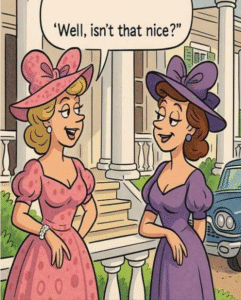Porchlight Confessions: A Southern Tale of Lace, Legacy, and Longing
Two Southern Belles were chatting on the porch of a grand white-pillared mansion. The air was thick with magnolia and memory, and the cicadas hummed like a choir of ghosts. It was late afternoon, that golden hour when the sun slants just right and everything looks like it’s been dipped in honey. The mansion behind them—three stories of faded grandeur—stood like a relic of another time, its columns proud, its paint peeling in places like a woman who refuses to admit she’s aging.
Clara Belle Fontaine sat in the wicker rocker closest to the mint juleps. Her dress was pale blue, cinched at the waist, with a hem that flirted with her ankles. She wore pearls, not because the occasion demanded it, but because she believed a lady should never be without them. Beside her, Louisa Rae Delacroix leaned against the balustrade, one slipper dangling from her foot, her hair pinned up in a way that suggested she’d done it herself—and done it well.
They weren’t young anymore, but they weren’t old either. They were in that Southern sweet spot where a woman’s age is less about numbers and more about stories. And both of them had plenty.
“I swear,” Clara Belle said, sipping her drink, “if that boy of mine marries that Yankee girl, I’ll have to start drinking before noon.”
Louisa Rae laughed, low and throaty. “Honey, you already do.”
Clara Belle gave her a look. “That’s medicinal. For my nerves.”
They paused, letting the breeze carry their silence. Somewhere down the gravel drive, a car door slammed. The sound echoed like a punctuation mark.
“You ever think,” Louisa Rae said, “that we were born in the wrong century?”
Clara Belle tilted her head. “You mean back when corsets were currency and women fainted for sport?”
“No,” Louisa Rae said. “I mean back when people knew how to stay put. When families didn’t scatter like dandelion fluff. When a porch like this meant something.”
Clara Belle looked out over the lawn, where the hydrangeas were blooming in reckless blues and purples. “It still means something,” she said. “Just not to the people who should know better.”
They were quiet again. The kind of quiet that only old friends can share without discomfort. The kind that holds history.
🧵 Threads of the Past
The mansion had belonged to Clara Belle’s grandmother, then her mother, and now—technically—to her son, though he lived in Atlanta and rarely visited. Louisa Rae had grown up two streets over, in a house with fewer columns but just as much pride. They’d been debutantes together, bridesmaids for each other, and co-conspirators in more than one scandal that never made it past the garden gate.
They remembered when the porch had been the center of everything. When suitors came calling with flowers and intentions. When gossip was currency and secrets were traded like recipes. When summer nights stretched long and slow, and the only thing faster than the fireflies was the flutter of a heart.
But time had a way of rearranging things. The suitors became husbands. The gossip became grief. The porch became a place to remember instead of anticipate.
And yet, they still came. Still sat. Still talked.
Because some rituals are too sacred to surrender.
🎭 The Unspoken Tension
Louisa Rae lit a cigarette, even though Clara Belle hated the smell. She did it slowly, deliberately, like she was lighting a fuse.
“You hear about the auction?” she asked.
Clara Belle stiffened. “What auction?”
Louisa Rae exhaled. “The one for the old Carter place. They’re selling everything. Furniture, silver, even the chandelier.”
Clara Belle’s lips tightened. “That chandelier belonged to Eleanor Carter’s great-grandmother. It came from Paris.”
“Well,” Louisa Rae said, “now it’s going to someone with a paddle and a checkbook.”
They both knew what it meant. Another piece of the past, gone. Another house emptied. Another family name reduced to a line item.
Clara Belle took a long sip. “We should go.”
Louisa Rae raised an eyebrow. “To bid?”
“To bear witness.”
🌿 The Weight of Place
Southern identity is stitched into architecture. Into porches and parlors, into creaking floorboards and clawfoot tubs. It’s in the way light filters through lace curtains, in the smell of lemon verbena on a windowsill. It’s not just about geography—it’s about memory.
And for Clara Belle and Louisa Rae, the mansion was more than a home. It was a repository. Of laughter. Of loss. Of lineage.
They’d watched the world change from that porch. Watched girls become women. Watched wars end and begin. Watched the rise of air conditioning and the fall of handwritten letters.
And through it all, they’d kept talking.
Because talking is how Southern women survive.
💡 What We Learn
From Clara Belle and Louisa Rae, we learn that friendship is a kind of architecture. That porches are sacred spaces. That memory is a form of resistance.
We learn that aging doesn’t mean fading. That stories don’t expire. That rituals—like mint juleps at sunset—carry more weight than headlines.
We learn that grief can be shared. That laughter can be defiant. That silence can be eloquent.
And we learn that even as the world changes, some things—like the bond between two Southern Belles—remain beautifully, stubbornly the same.



